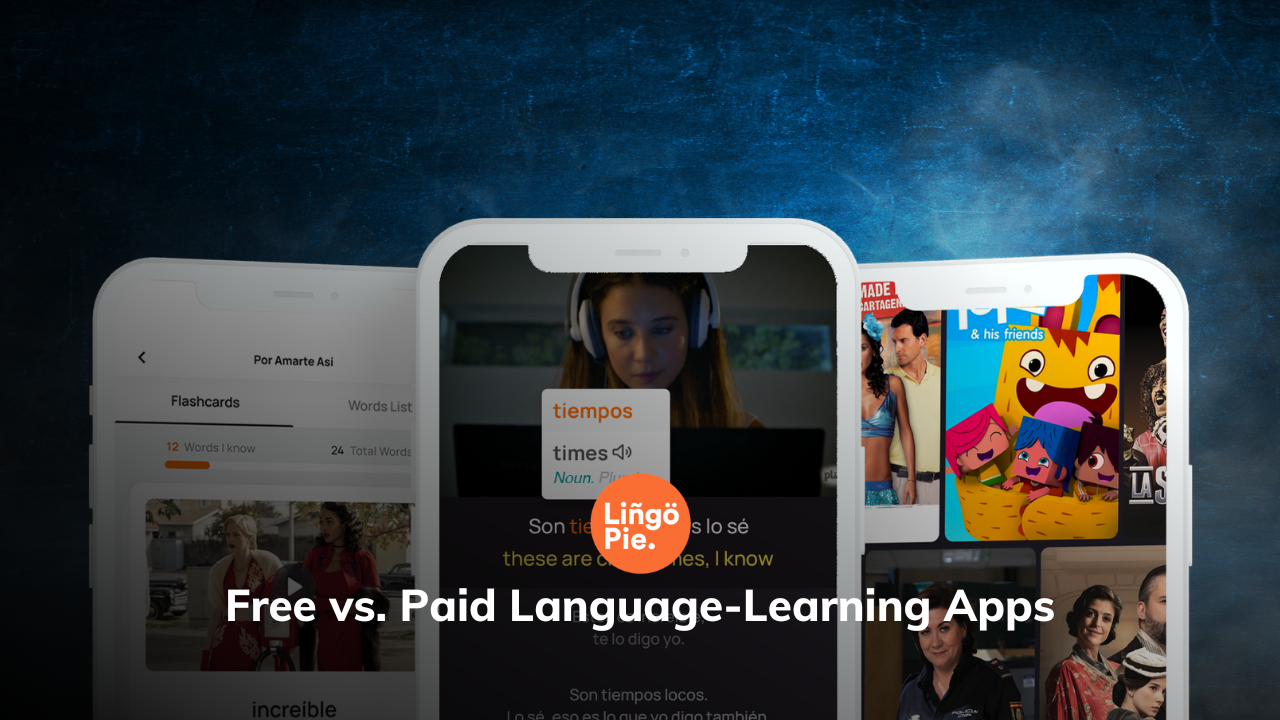Welcome to your complete and concise guide on how to become a polyglot!
Today, we'll break down what it means to be a polyglot and how to become a speaker of multiple languages. Whether you speak just one language, or you are a keen foreign language learner, we will provide advice for learning your next language.
There are many benefits to being a polyglot, including work and travel opportunities and increased cognitive function. So, what are you waiting for? Let's start language learning today!
Head over to Lingopie if you'd like to start learning French, Spanish, Italian, Portuguese, German, Russian, Japanese, or Korean.
What Is A Polyglot?
A polyglot is someone who speaks several languages to a high conversational level. The word polyglot comes from the Greek word polyglōttos. This is a combination of poly, meaning "many" or "multi," and glōtta, meaning "language."
Notable historical polyglots include Cleopatra, Queen of Egypt, and Elizabeth I, Queen of England and Ireland, both of whom spoke around ten languages.
Now, let's look at how to become a polyglot with 7 top tips.
The 7 Best Ways to Learn Multiple Languages
1. Consider Which Languages Complement Your Native Language
When choosing your next language, it is worth considering which languages are easiest to learn based on your native language. Most languages, unless they are language isolates, belong to a family of languages, meaning they have related languages.
This means language learners can focus their efforts on a new language that shares roots with their first language.
For instance, it is generally quite easy for English speakers to learn French or Spanish. If you speak English, you already know the Latin alphabet, for one thing. Moreover, these languages all share roots in the Indo-European language family.
Of course, if you have a particular language in mind that you would love to learn, even though it has no connection to your own, you can absolutely take on the challenge. With a great teacher or language-learning app, anything is possible.
You can learn Spanish with Lingopie Music, or check out this list of the 7 best language-learning apps.
2. Language Learning Apps
One of the best ways to learn independently is to work through a well-reputed language app. These apps are designed to make learning accessible and allow you to develop your language skills at your own pace.
There are many language apps to choose from, each with its own selection of languages, price structure, teaching methods, and so on. Generally, most apps allow you to set a daily goal and send you notifications to remind you to do your 10 minutes of language study each day.
Remember that some apps concentrate heavily on speaking, while others will focus more on sentence structure, complex grammar terms, and more linguistic concepts.
If your aim is to become fluent, you can use apps that facilitate language exchanges or book multiple sessions with a language teacher to make sure you get your speaking practice in.
You can also learn several languages simultaneously with most language apps. Apps like Ling and Falou offer many different languages, so find the one that suits your learning style and budget and start learning today.
Related:



3. Watch TV and Movies
Another great way to learn one or many new languages is to watch TV and movies in your target languages. This provides quality exposure to other languages and allows you to learn useful words and phrases in context.
Moreover, you can develop your understanding of pronunciation and tone by hearing native speakers use their language authentically.
Find great foreign-language TV and movies on Lingopie and engage with the site's interactive features to deepen your learning. You can save new words as digital flashcards and complete quizzes to solidify them in your long-term memory.
As well as gaining natural exposure to words and phrases, you will also gain an insight into different cultures, pieces of history, traditions, and societal values through engaging with foreign content.
4. Read and Listen to Books
To work specifically on your reading and listening skills, it is a great idea to sit down with a foreign-language book or audiobook for a few minutes every day.
Audiobooks are great for listening comprehension, while paper books are ideal for reading practice and exposure to grammar and spelling. Reading a book while listening to the audiobook will help learners follow the audio and make the literature more accessible.
You can even choose a story you are very familiar with, like the Hunger Games or Harry Potter, for instance, and read or listen to it over and over in different languages. This gives confidence to beginners and makes reading more enjoyable.
If reading the same book multiple times gets dull, mix it up and engage with new content. Just try not to push yourself too hard and get put off - it is okay to read children's books as an adult in a second language!
5. Visit the Countries that Speak Your Target Language(s)
Speaking is one of the key language skills and one that learners can shy away from. A great way to overcome your shyness is to immerse yourself in the language and put yourself in positions in which you simply have to speak.
If you have the resources and the time, visiting or moving to a country where your target language is spoken will be a huge advantage.
The more activities you do in the local language, the faster you will pick up your new language. Get involved in community groups, order food and drinks, socialize with natives, and listen to the local radio.
Talking with a native speaker will improve your confidence, pronunciation, and fluency. They can provide you with useful feedback and you can learn that it is okay to make mistakes when you speak. It is all part of the journey.
Speaking a new language is daunting, but the more you try, the easier it gets and you will soon notice your fluency improving.
6. Explore Different Language Learning Strategies
Other polyglots will tell you that once they discovered their preferred language-learning methods, the process of learning more languages got much easier and faster.
There are several memory techniques to help you learn a language quickly, such as mnemonics, flashcards, image association, and rhymes. These techniques are great for retaining new words in long-term memory.
You may want to learn one language at a time, or else fast-track your progress and work out how to learn multiple languages at once.
Try Laddering Your Languages
If you are learning several languages, you might benefit from the laddering technique. This method encourages language learners to learn a new language with one of their other foreign languages.
Imagine your known languages are rungs on a ladder, with your base language, or first language, as the bottom rung. Your second language is the next rung up, and so on.
A mental hierarchy of languages is thus created. So, English could be your base language, Italian might be your second and Mandarin Chinese might be your third. Some people will have four, five, six, or more languages on their ladder.
If you want to translate a word into Mandarin Chinese, instead of jumping straight to that language, you start by translating it into Italian, then you go to Mandarin from Italian. This creates extra connections in your mind and can reinforce learning.
You might also use Italian-language textbooks for learning Mandarin. This reinforces your learned Italian by exposing you to quality, practical language, and all the while you are also learning your next language.
7. Practice Every Day
Becoming a polyglot takes work and commitment. You should schedule time every day to learn languages. Constant practice is essential for development and momentum in your learning journey.
The more time you set aside for learning, the faster your progress will be. However, even just ten minutes a day is better than nothing.
You can split your learning between fun immersive activities, like watching foreign TV, and more studious activities for learning complicated grammar and more complex language. You might want to use textbooks or language apps for the latter.
Set yourself language learning goals to keep you accountable and on track. You might want to speak at level B1 by summer, or else learn 10 new words each day.
Keep a record of the words you have learned so you can look back to revise the content. This record of past learning will also serve as positive reinforcement and motivation as you can see how far you have come.
The Main Benefits of Becoming a Polyglot
Work and Travel Opportunities
If you only speak one language, even if that language is English, there are limits to how much of the world you can travel with confidence. Moreover, employment opportunities in other countries are often tied to your ability to speak another language.
Some languages offer more opportunities than others. If you can speak Spanish, you can speak to around 500 million people spread over several continents.
However, all languages offer the incredible opportunity to delve into a new culture entirely different from your own.
Becoming a polyglot is the best way to explore the world, give yourself an edge in the competitive world market and move beyond the opportunities available to you in your native tongue.
How many languages you know will determine how much of the world is opened up to you.
Cognitive Function
Becoming a polyglot has proven benefits for the brain, such as improving intelligence, keeping the mind sharp, and holding off the negative effects of aging. Studies suggest that polyglots are less likely to develop Alzheimer's disease.
This is due to the increased connectivity in the brain that comes from being multilingual. Not only can dementia develop far later for these individuals, but they also have an increased ability to deal with the loss of brain function.
Some people worry that if they try to learn several languages at once they might confuse languages and overwhelm the brain. However, there are ways to avoid this, such as choosing two distinctly different languages, like Italian and Chinese.
Learning several languages is actually a great brain activity. It increases brain mass and improves memory.
Exposure to More Culture, Art and Science
And finally, a huge benefit of becoming a polyglot is the plethora of new literature, art, music, plays, TV shows, movies, art, and scientific writings that become available to you.
Becoming fluent in any other language is a huge achievement and allows you unrestricted access to a rich new culture. However, you do not need to be fluent to enjoy these perks. Even beginner and intermediate learners can begin to appreciate other cultures and learn more about different societies.
FAQs: How to Become A Polyglot
How many languages are required to be a polyglot?
Depending on who you ask, some people would say that the word polyglot means the ability to speak more than two languages. However, others would posit that to be a polyglot, you have to know at least four or five languages.
Can anyone become a polyglot?
Yes, realistically, anyone could become a polyglot, if they had the time, resources, and passion for learning languages. However, less than 3% of the world's population actually speaks more than four languages. This is largely due to a lack of time, access, and drive to learn multiple languages, rather than a lack of ability.
How do polyglots learn so fast?
Some people have a natural propensity for language learning that allows them to learn words quickly. While not everyone shares this gift, anyone who wants to learn a second or third language should be encouraged to do so. Generally, once you have learned a couple of languages, the rest come easier.
If you meet someone learning their third, fourth, or fifth language, the chances are they have worked out how they learn best, applied their knowledge of other languages to their current language, and, perhaps, have learned languages from the same language family.
What language should I learn first to become a polyglot?
If you are looking for the easiest languages to learn as a beginner, you should consider your mother tongue. Some languages are easier than others depending on which alphabet you already know, whether they are from the same family as your native language, and how much access you have to them.

Summing Up: How to Become A Polyglot
Now that you know how to become a polyglot, you are ready to start learning multiple languages! If you do not know any foreign languages yet, you might want to start by learning just one language at a time and work up from there.
Choose whichever language appeals to you most, or a language that you think will be easy based on your native tongue.
Use language learning apps, movies, and books to practice your language skills. Travel to a country that speaks your target language, if possible. Moreover, explore different learning methods and practice daily.Remember to check out Lingopie, the language-learning platform that helps you binge your way to fluency in 8 popular languages.







![4 Hacks to Learn English With Movies [2025 Guide]](/blog/content/images/size/w300/2023/10/88AAD01A-8BF3-4648-82CC-639C1B240C28.png)
![Language Difficulty Ranking For English Speakers [2025]](/blog/content/images/size/w300/2025/05/Language-Difficulty-Ranking----For-English-Speakers.png)
![Language Learning with Netflix [2025 Guide]](/blog/content/images/size/w300/2023/05/Netflix-AD.jpg)
